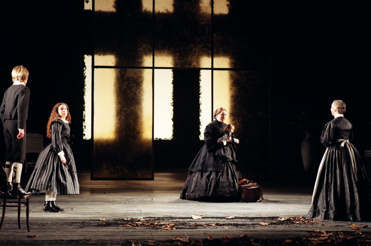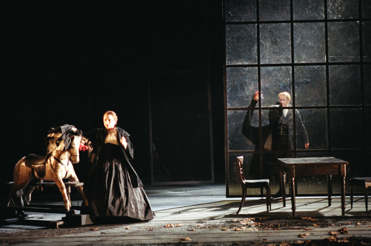Other Links
Editorial Board
- Editor - Bill Kenny
- London Editor-Melanie Eskenazi
- Founder - Len Mullenger
Google Site Search
SEEN
AND HEARD OPERA REVIEW
Britten, The Turn of the Screw:
Soloists, Orchestra of the English National Opera cond. Garry
Walker. Directed by David McVicar. London Coliseum, 1.12. 2007
(ME)
English National Opera regards Britten as its ‘house composer’ so
it is gratifying that the company’s second major success in six
months (not too bad a record) should be with a Britten work: this
production by David McVicar comes to ENO from the Mariinsky
Theatre in St Petersburg, and like the earlier ‘Death in Venice’
by Deborah Warner it is deeply conventional despite the occasional
gloss of originality. Indeed, chills were few and far between at the Coliseum: even
Quint’s ‘Take it, take it’ was gently persuasive rather than
spine-tingling, and the ‘apparitions’ at the tower and the lake,
whilst visually striking, did not inspire much in the way of
shivers. The wide, half-empty set, dressed as if for a rather
trendy minimalist Christmas, did little to suggest the
claustrophobia of the old house in its marshy setting, and the
frequent sliding of the frosty panels and the constant movement of
supernumeraries were unwelcome distractions.

George Longworth (Miles) / Nazan
Fikret (Flora) / Rebecca Evans (Governess) / Ann Murray (Mrs
Grose
Rebecca Evans and Ann Murray make for perfect casting as the
Governess and Mrs Grose: both have highly individual, at times
edgy voices, and both are adept at suggesting surging passions
beneath maternal exteriors. This Governess is presented as an
heroic failure rather than a deluded participant, a concept which
works equally well although it forfeits some of the intimacy we
might otherwise feel for the character, and Murray’s Mrs Grose was
rather more cosy than I would like for such an enigmatic character
– fortunately there was enough mystery in the voice to compensate
for this.
The two ‘innocents’ were superbly taken by Nazan Fikret, already
an experienced Flora, and Jacob Moriarty who will be remembered by
anyone who saw the ROH Wozzeck in which he gave a touching
portrayal of the protagonist’s son – the ‘ceremony of innocence’
seemed to have been drowned out of this boy at a very early age,
and the way in which his manipulative quality was more than
suggested, was quite disturbing.
Timothy Robinson seemed to have been asked to emulate various
portrayals of Uriah Heep – odd, since Quint is far from ‘very
‘umble’ – it was also strange that this Quint had so little in the
way of dangerous allure, his power mainly suggested by the voice,
a plaintive and exactly focussed, if hardly mellifluous, one.
Cheryl Barker’s Miss Jessel evoked beauty in both voice and
person, although she was hardly differentiated from the ‘living’
Governess in that her presence was fairly cosy as opposed to
malevolent. In the scene where she appears in the schoolroom, she
merely walks on and sits down pleasantly, as if she were an
invited guest – what a contrast to the RCM’s stunning production
in which the import of Miss Jessel’s tragedy and her baleful
influence were so wonderfully suggested by the way in which she
suddenly appeared, one arm draped over the table and a look in her
eye as if she could kill with a glance. In the original story,
Henry James writes ‘…her haggard beauty and her unutterable woe,
she had looked at me long enough to appear to say that her right
to sit at my table was as good as mine to sit at hers.’ There was
nothing of this in the present production.

Rebecca Evans (Governess) /
Timothy Robinson (Peter Quint)
The orchestra gave a delicate, nuanced reading of the score under
Garry Walker, with some finely detailed strings and spooky celeste
around Quint – indeed, there were many instances where the only
frisson was coming from the pit. This is a visually
attractive, very well sung production, with sensitively evocative
lighting (Adam Silverman) and I went home feeling somewhat
stirred, but definitely not shaken.
Pictures © Neil Libbert /
English National Opera
